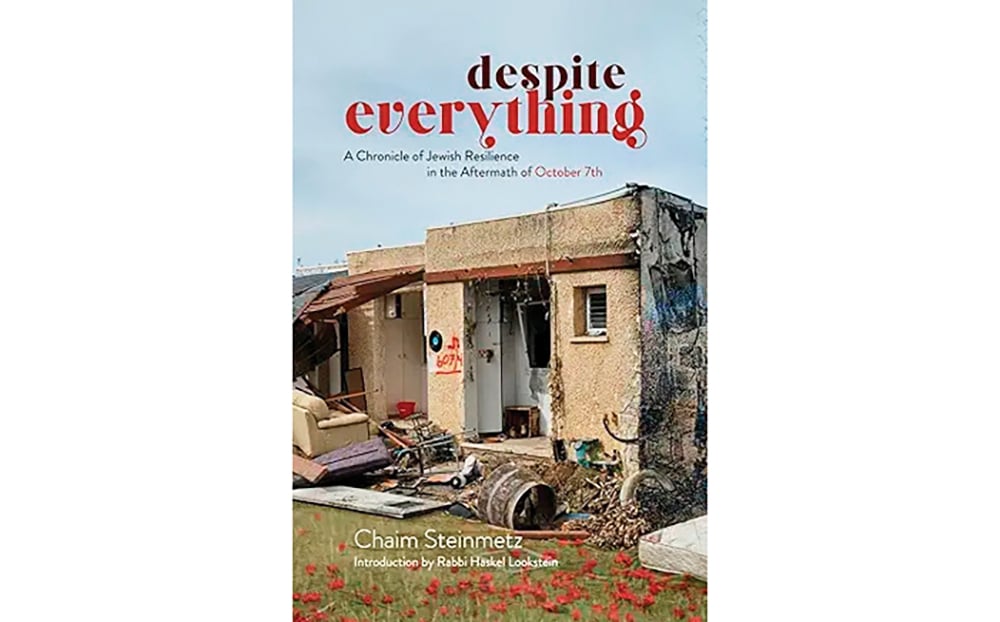
Highlighting: “Despite Everything: A Chronicle of Jewish Resilience in the Aftermath of October 7th” by Rabbi Chaim Steinmetz. Independently published. 2024. Paperback. 269 pages. ISBN-13:
979-8340458070. Reading age: 10-18 years.
It was with great admiration and excitement that I recently read “Despite Everything: A Chronicle of Jewish Resistance in the Aftermath of October 7th” by Rabbi Chaim Steinmetz. For me it was slightly more personal as Rabbi Chaim and Lisa Steinmetz are friends; he led Congregation Tifereth Beth David Jerusalem, better known as TBDJ, in Montreal. They have maintained deep friendships with their former congregants, who happily celebrate the rabbi’s success in his new position. He is currently the senior rabbi at Congregation Kehilath Jeshurun (KJ) in Manhattan.
Over the past year, in his weekly email message to his congregants, he would expound on the parsha and how it related to the terrible atrocities that our brothers and sisters in Israel are living through, as well as the upsurge in antisemitism throughout the U.S., including on our college campuses.
As an example, in writing about Parsha Vayishlach directly following a KJ mission to Israel, he wrote of the wrestling match that Yaakov had with an angel. They wrestled for hours until at one point the angel begged Yaakov to let him leave. During the KJ mission, Dan Polisar of Shalem College addressed the group. He related the story of how his son, a commander in Gaza, had some shrapnel hit his helmet. As a result he was taken to the hospital, checked out and advised by the doctor not to return to his duties but rather to rest for several days. He and his son “wrestled” with the doctor because the son felt the need to immediately return to his men in Gaza. The doctor was vehemently opposed to this. They asked to speak with a supervisor and then to the head of the hospital. As father and son sat in the waiting room discussing what to do, another soldier with a bruise on his arm heard their predicament and asked what difference it made if the doctors said not to go. He suggested that the son just jump on a transport and be off, which is what he did.
In another story the author mentions a meeting between Herman Wouk and David Ben-Gurion. Ben-Gurion invited Wouk to visit him in Sde Boker. At that time there were fedayeen terrorists regularly invading from Gaza, and Wouk was advised to leave and return to Tel Aviv with an army escort prior to sunset. Before his departure Ben-Gurion asked Wouk when he would be making aliyah. He assured him that living in Israel would be the first time that he would feel free. Wouk couldn’t believe the question. He asked Ben-Gurion how he could be considered free, living surrounded by enemies and not being able to go on the roads anytime after sunset. His response was, “I did not say ‘safe.’ I said ‘free.’”
Detailing so many of his meetings with survivors and families of those who were murdered, Rabbi Steinmetz writes that one day he believes a Megillah will be written similar to the Book of Esther on the traumatic slaughter which began on October 7.
Upon his meeting with Rabbi Tamir Granot, who is the rosh yeshiva of Ohr Shaul located in Southern Tel Aviv, the two discussed the tragic loss of the rav’s son, Amital Granot, HY”D, who died on October 7 from the barrage of missiles fired at Israeli soldiers in the North. In explaining how he lives with this tragedy, Rabbi Granot shared that he is concentrating on the goodness of people and the need to bring all sides together to better understand each other. Prior to the war the extreme divisiveness of the citizens of Israel was overwhelming. Once the war began, factions began to realize that they are all on the same side in wanting their homeland to be safe, and they rallied together for the sake of Eretz Yisrael. The country came together in greater unity than had been seen in years. His hope is that as this war continues the factions will not begin to once again move into their own cocoons of disrespect and hate.
As Rabbi Steinmetz writes: “We are wrestling once again, and that’s never easy, but we are wrestling for something bigger. And thank God we have our own sovereignty, our own state, our own army. Thank God we’re free and that is worth wrestling for.”
I enthusiastically encourage everyone to read Rabbi Steinmetz’s wise words. One can gain a wealth of knowledge from the comparisons of the weekly parshiot and our leaders in those days to what we are seeing today. The author relates so many of his experiences in Israel during his mission and brings the humanity of this awful war to our eyes and hearts even more clearly than we may have already experienced. “Despite Everything” is available on Amazon.
Nina Glick can be reached at nina@jewishlinknj.com.








